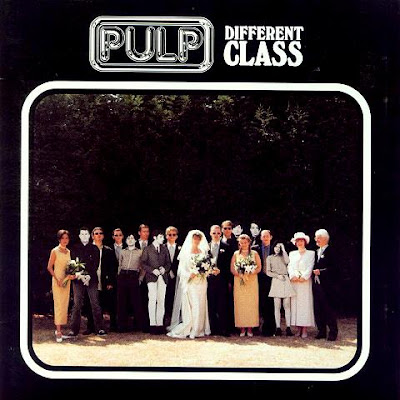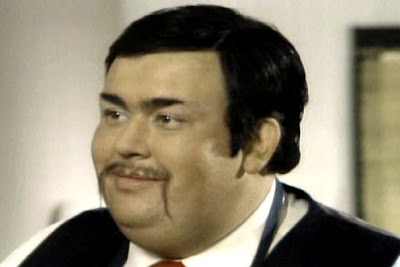
Change was on the wind in the
UK in
1994.
The Labour Party had started using "New Labour" as a slogan that year, which turned into a party manifesto by 1996, sweeping
Tony Blair into the office of Prime Minister...Now, I'm not going to pretend to fully understand UK politics, except to say that the Labour Party grew out of trade unions in the early 20th century, with a healthy dose of socialism thrown in, and that means it's the party of the working class.
Or at least, it should be. As I understand it, the Labour Party under Blair tended to be more conservative in nature, and actively represented the middle class moreso than the working class. This pissed off the more liberal, socialist members of the Labour Party, many of whom simply quit the party in disgust. New Labour, as they tell it, wasn't really any better for the working class than Thatcher's Conservative administration had been. What's probably most important to my rant today, however, is that New Labour promised a modernization of British life, and there was a real sense of change and progress and a bright future in the UK, which in 1994 was felt by everyone in the UK, regardless of their socio-economic status.
This newfound sense of optimism found reflection in the hip youth culture of London, which came to be called
"Cool Britannia", a term that very quickly became nothing more than a slick and benign marketing slogan. This, of course, is not surprising.
Britpop was a crucial component of this whole
Cool Britannia thing, and to that end,
Blur and
Oasis are the two biggest bands falling under the Britpop banner. But as much as Britpop looked inward at it's own culture out of a sense of nationalism, it was also a reaction to
American Grunge. This seemed to be especially true of
Blur, whom more closely examined more aspects of British life than any of their contemporaries, and also mined British musical history more deeply and widely. Meanwhile, Oasis seemed to content to ape
The Beatles and a bit of
The Rolling Stones, and not much else. Blur touched on those two bands, naturally, but also
The Kinks,
The Who,
Pink Floyd,
David Bowie,
The Jam,
The Fall, Stiff Records-style Pub Rock and New Wave, British Townhall music, Britfolk, the whole Madchester scene, and later on, Techno and all sorts of Electro genres, not to mention musical influences from such places as
Morocco, Pakistan, India - the music of the working class immigrants of the UK. Later on, Damon Albarn explored Hip Hop via
Gorillaz, and Dub Reggae via
The Good The Bad The Queen, two more working class musical genres
, and you can probably sense where I'm going with this.
Blur came from
Colchester, originally an old Roman city about 50 miles northeast of London that is considered the oldest city in the UK. It's history has been one full of immigrants and the working class, and naturally a more socialist sensibility, so it isn't a surprise that Albarn was so deeply interested in British history, modern British life, and in particular, the working class, whether born on the island or not. It's in his bloody Colchester roots.
But
Blur went to London, as any sensible British rock band would and should do, and while they found themselves at the top of the Britpop heap, they weren't always the most optimistic of bands. Albarn recognized the renewed optimism sweeping the nation, and I think he liked it, although he himself wasn't always the most optimistic of commentators on modern British life, and thus Blur were never the outright Populist band that Oasis were...
Albarn not only had a good view of the bigger picture, but his lyrics could often show a fine eye for detail, and the reality of Cool Britannia wasn't necessarily too cool, especially for immigrants and the working class.
Let's not forget that the title of their 1993 album is
Modern Life Is Rubbish.
But this is about their 1994 follow-up LP,
Parklife.
Stylistically, it's probably their most varied album, jumping through many of the touchstones and genres I mentioned above, and lyrically, it also examines modern British life from several different perspectives, but yes, most notably from a working class perspective.
As I understand it, Albarn was most influenced on these songs by London's
East End, which is decidely working class, and distinctively multi-cultured.
But enough! This is supposed to be about the album cover...
Plenty of experts will tell you that Greyhound racing had it's origins in the UK - Wales in particular, but what I think is relevant to this blathering rant of mine is the idea that dog racing is a decidedly working class "sport", whereas horse racing is more popular among the middle and upper classes.
Put simply, dogs are more plentiful and cheaper than horses.
So, I must say that Blur couldn't have used, wouldn't have dared used, a picture of a horse race. It would have betrayed the band and the narrative of these songs, taken as a whole. An actual
ALBUM, a thing of rare beauty these days.
No, it had to be dogs racing, and here we are.
Aside from any deeper meaning, this is simply an amazing, intense, and beautifully captured photograph by a man with a the remarkably working class name of
Bob Thomas. When we see the photo for the first time, the image becomes permanent. We never need see it again, and in that respect, it's a rock solid marketing decision by
Stylorouge. Add the band's recognizable logo in high-contrast yellow in the blurry foreground, and maybe I'll call it a stroke of genius.
The deeper meaning?
Working class dogs. Working class dogs chasing a fake rabbit around an enclosed dirt track, and damn it, at least horses get to run on grass alot of the time. Not dogs. Dogs always run on dirt, and the best they get outta the deal are meals and a warm place to sleep. That's if they're halfway good. If they ain't so good, they're more expendable, and more likely to get abused, you know? Yeah, that sounds alot like the working class. East Enders and immigrants. Dirt and grime and cheap vices. Gambling at dog tracks, you know?
But hey, it's not all gravy for the horses, you know?
I mean, horses run because they have to...They mostly like to stand around eating grass, and so they've got predators, like wolves...Like dogs.
Look at the teeth on that black dog. Those teeth will fuck up the neck of a slow horse just as easily as a fake rabbit, and if you don't agree and believe that the working class would ever rally and bark at demonstrations, and riot and revolt and attack if they got hungry enough, abused enough, oppressed enough, arrested enough, sent to war enough, made to run around in circles repeatedly and endlessly for a meager living, but never ever able to actually
feast...If you don't agree with any of that, you probably haven't read this far anyways...
For those of you still with me on this - I'd simply mention the metal muzzles on those dogs. Their masters know what I'm talking about here.
But...Anyways...
It all comes down to the eyes, as it always does. The windows into the souls of dogs as well as mankind, if yr inclined to believe in such things as souls...
More than the teeth, this photograph is indelible because of those eyes...The intensely dark orbs of the brown dog on the right, two white points of raw, fierce hunger staring straight back into our own dark lives. I dare say, like a canine freight train coming round the mountain, bearing right down on us like an inevitable and bloody disaster.
But ultimately, it's that right eye on the black dog on the left that freezes me in my tracks. Not only is it the glare of carnivorous hate and contempt, but I sense a fair and measurable amount of pain and struggle in that dog's eye as well. And maybe it's nothing more than seeing a bit of the white of that eye, but I also feel as if that dog still might have some hope.
Maybe it's me that's hoping. Hoping that dog eventually gets a bit of what he wants, and not just what he needs. Hoping the working class gets a fairer share. More comfort, more security.
Hoping I get some of that too. I'm a working class dog, after all, and chances are, so are you, and from what I hear, a working class hero is something to be, so let's all "hold thumbs" as my grandma liked to say.
Hotcha! HankLabels: a critical analysis of album cover art in a post-album culture, album covers, Blather, Blur, music



































